Full video
https://t.me/ButusovPlus/13470
“Even in a gunfight, we’d just get our asses kicked by the simplest rifles.”
Russian soldiers posted a video testing the “unparalleled” bulletproof vest “Module-Monolith,” produced by JSC “Special Materials Research Institute” (St. Petersburg). During the experiment, all five bullets penetrated the armor plate completely. The soldiers expressed their dissatisfaction with the quality of the heavy and useless gear: “Just f*cking great. Thank you, Ministry of Defense.”
They gon’ have to Marty McFly that shit.
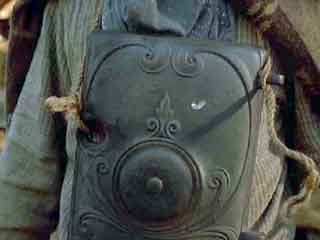
PAN SHOT

Do you feel lucky, punk?
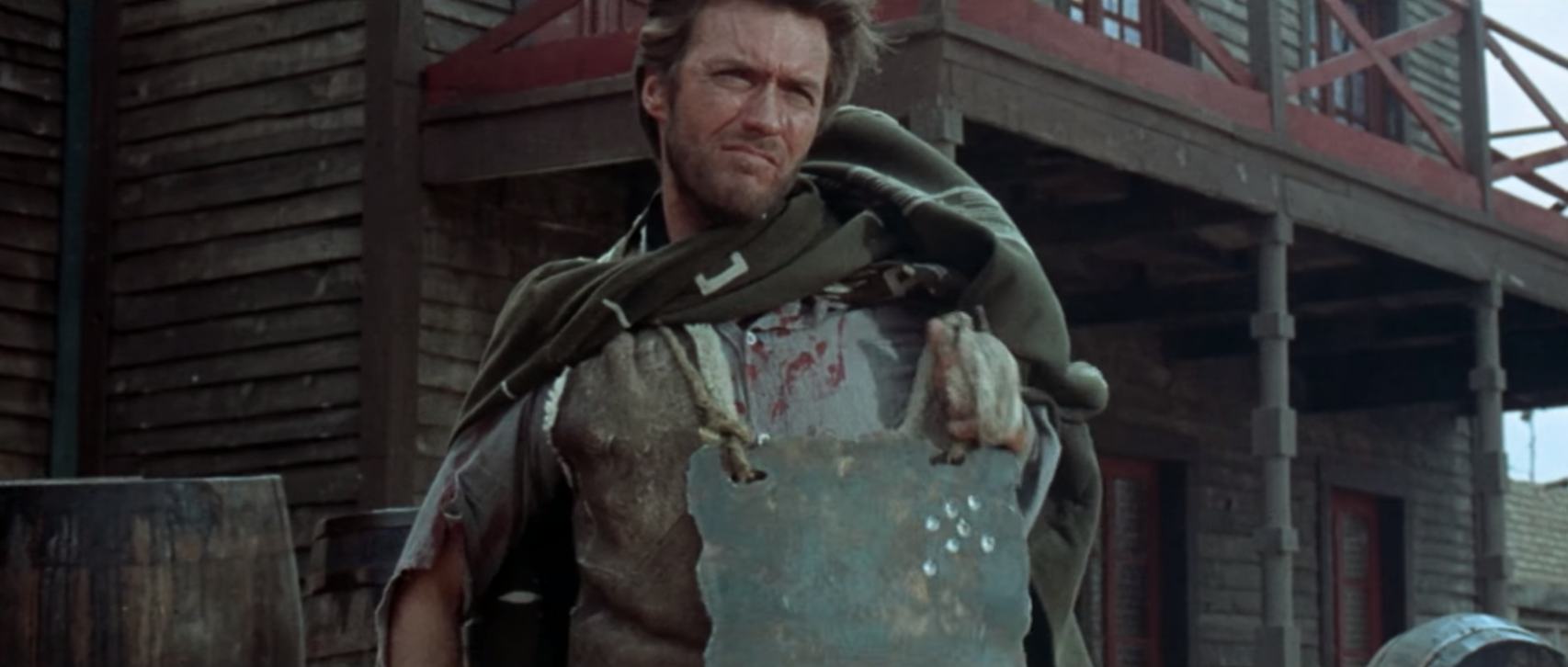
Gotta love that it’s the work of a technical institute. I guess that’s the kind of technological development they can expect after all the good scientists left that shithole.
My guess is, the institute developed a competent armor, showcased it and got the contract to build them.
Then several levels of managers and executives decided to use a bit less material, use a cheaper supplier and skip a few QC steps, pocketing the surplus contract money.
And then they re-used the vests taken off fallen soldiers several times, sewing shut the bullet holes in the cloth covering (or not).The honest people were ran out of the organization or the country years ago - maybe through a window - until only parasites feeding off parasites remain.
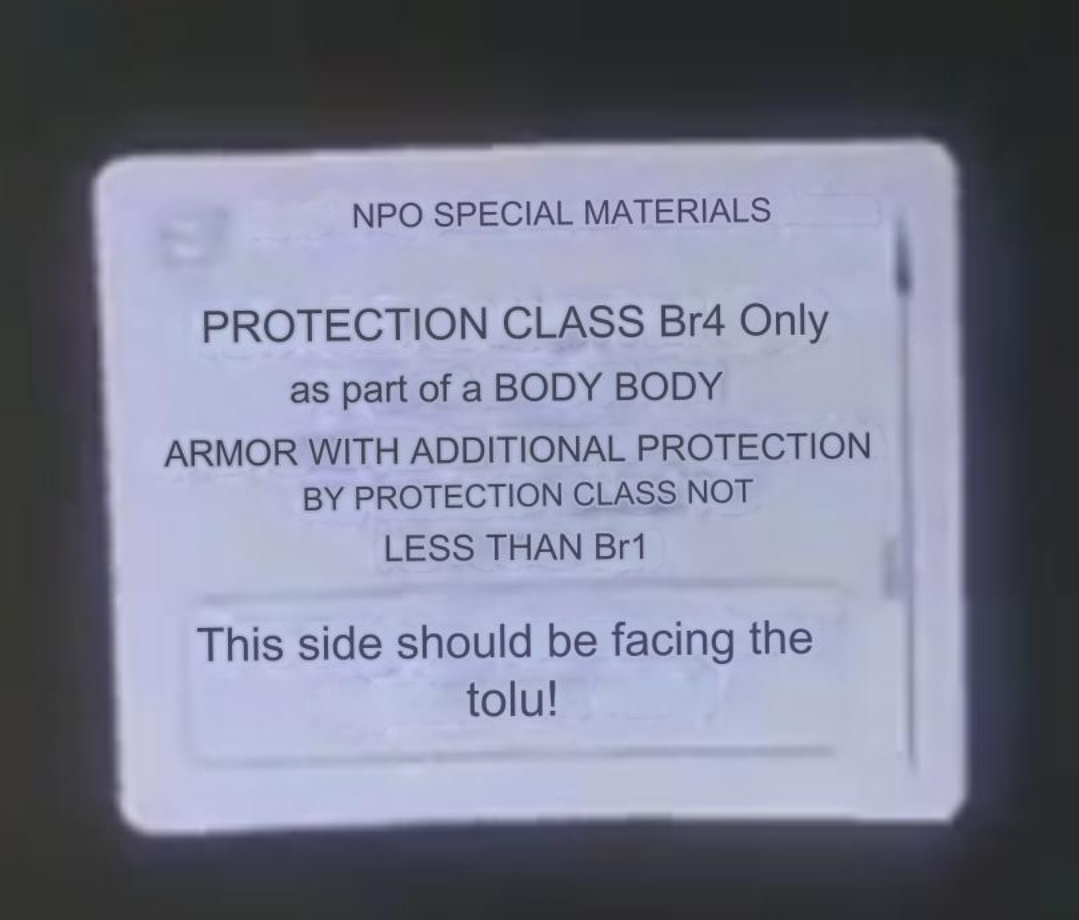
Here is the translated classification of the body Armour
Someone Def skimmed off the top of the pot during production lmao
And here is the rating of BR4 body Armour
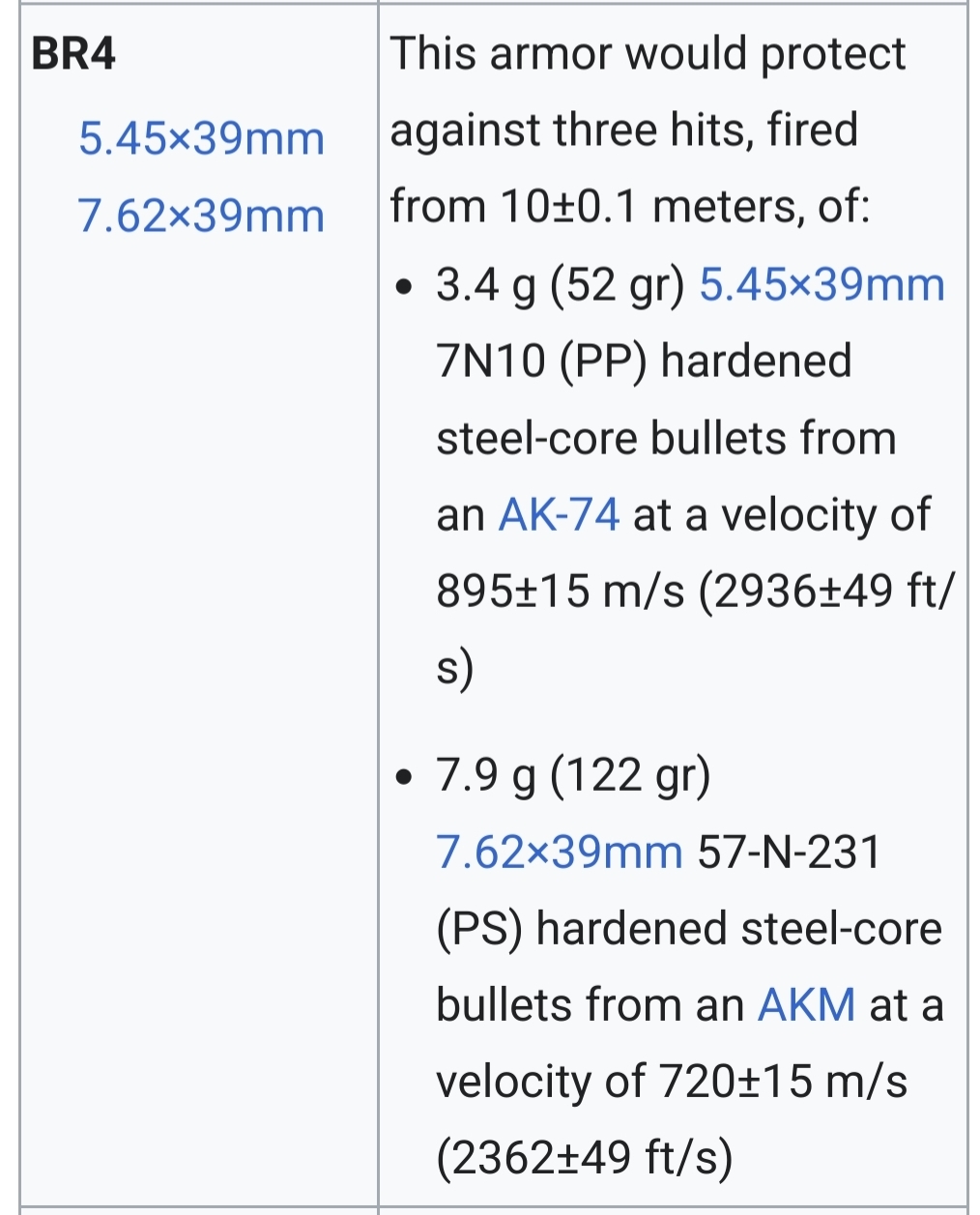
So protection for 7.62x39 and shot with 7.62x54r. No surprise it lost.
It was shot with standard x39 (AFAIK) … x54r is the bigger cart used in dragunov or PKM
Those cartridges sure looked like 54r to me. But I could be wrong
You are wrong, those are 5.45x39mm being fired out of an ak-74. 7.62x54r are much bigger and don’t have an associated Bakelite mag like the one used, and on top of that they aren’t fire out of AKs. The only thing close is a molot hunting rifle.
Got it thanks for the info. Just some terrible armor I guess.
deleted by creator
Interesting to think that the U.S. has spent so much money to develop and test a new bullet and rifle combo specifically to beat Russian body armor, all for naught.
It’s what the US always does. Russia claims to have this or that so the US builds something to defeat it. It’s happening with China now too.
I am confident that the US has samples of Russian body armor and has performed penetration testing and taken the results into consideration in doing its assessments.
This particular plate may be sub-par relative to how it’s supposed to perform. But body armor is not hard to get ahold of; you can’t keep it that secret. This isn’t going to be a MiG-25/F-15-type scenario, where the US dramatically misassesses capabilities and then goes to build something capable of defeating the (considerably-more-capable) system that it has theorized about. They’ll be making a decision based on being able to actually test the system in question.
Wasn’t it also for the fancy stuff that China is developing? Also this video doesn’t mean that Russia hasn’t produced better armour (they obviously have, that appears to be unhardened mild steel lol) , just that they can’t mass produce it.
Ah, didn’t think of that, probably so.
ProdigalFrog, it was a different time.
It was back when we didn’t know the Russians were incompetent.
Oh no. The US did that for China. And because it really was time for a new rifle.
lol, what material is this? just steel? five layers of tinfoil?
five layers of tinfoil
That ought to give just enough protection from the liquid that turns frogs gay, at the very least.
Maybe I just don’t know how bulletproof vests work, but shouldn’t there be some layers of energy dispersing material on top of that plate?
Is it a fair comparison without?
The plate should work on its own. The thing that stands out to me is there’s not even deformation. None of the impact is being caught and spread out. Just perfect holes. So yeah. Well outside the envelope for where the kevlar shell would have made a difference.
By the sounds of it they just used sheet metal lol
Yup. Just classic Russian corruption where there’s something in the inventory. Just not what it’s supposed to be.
Interesting, I learnt something new today.
Seems delightfully medieval as a solution. What does the Kevlar do? Mostly anti-spalling?
Stops shrapnel, pistol rounds, and spalling.
You might be thinking of the anti-spalling coating on the front. Not exactly required but helpful.
That layer traps the prices of the splattered bullet after it impacts the plate. Without it those pieces can hit your chin or arms.
OR you’re thinking of ceramic plates? Ceramic breaks up the bullet while the Kevlar behind it catches the slowed and broken pieces.
That’s probably exactly what I was thinking of.
I mostly see them in US media, and they always seem so thick. But then again, the Russian vest doesn’t, so I guess they’re for different uses.
At least for steel plate, it should work without any supporting material.
Kevlar around it would help catch spalling from a bullet flattening out and spraying little bits of shrapnel out across the surface, but since these ones aren’t actually stopping the bullets, there is no spalling to catch.
That isn’t good for the tree
maybe it’s only pistol rated lol that should come in handy in the modern battlefield
Designed for the safe looting of home appliance stores
still good against fragments
Clearly they just didn’t believe in the vests hard enough.
You make a joke but it is true. The vest isn’t meant to save troops life, it is meant to get to troop to go to the front line
I think that that’s a little from column A, a little from column B.
I don’t think that Russia is intentionally putting sub-par plate out there. I think that protective gear is procured with the intent of providing protection, and that if the armor doesn’t meet up with what it’s specified to do, that’s probably because somewhere, procurement or manufacturing screwed up in Russia.
On the other hand, militaries do really spend money and are willing to accept tradeoffs on things where they cannot protect a soldier and something makes a soldier feel safer, if they feel that it’ll make them more effective due to psychological impact. I remember reading about how American soldiers kept adding ad-hoc armor to tanks in WW2, sandbags and such. It wasn’t very effective. But…it also made soldiers feel safer to do it, so commanders often let them go ahead with it…shrugs My guess is that at least some of the benefit of body armor is that it does make soldiers more-comfortable with taking on dangerous tasks, and that that’s probably been taken into consideration.
https://old.reddit.com/r/WarCollege/comments/18hmn90/did_adding_sandbags_to_tanks_in_wwii_actually/
Only one official test of sandbags as an antidote against antitank rockets was recorded, which took place on 9 March 1945 in Europe. The side sponsons of a medium tank were covered with sandbags, and a Panzerfaust 60 was fired at it; the projectile blew away the sandbags and penetrated the armor. The same test was carried out against the glacis plate; the projectile tore off some of the sandbags but failed to penetrate the armor; whether the sandbags or armor set off the warhead or whether it ricocheted off because of the angle of attack is not specified. An Ordnance Department observer reported that “these tests are far from conclusive, and the psychological value of the sandbags is the greatest value actually derived,” while another observer stated that, “I gathered that if the bags did nothing more, they were certainly a morale factor as the crews were thoroughly impressed with them” after visiting units on the front lines that used them.
Ordnance Department officials in the European Theater, meanwhile, had a mixed reception to the sandbagging effort, despite the fact that in many cases, “Tankers disagreed, citing numerous examples where sandbagged tanks were not penetrated by panzerfaust or panzerschreck hits.” Third Army Ordnance personnel convinced Lieutenant General George S. Patton that the excess weight imposed on tanks by sandbags and their limited effectiveness against enemy projectiles was a net negative. Although American armored units had performed well during the Battle of the Bulge, the heavy tank losses incurred convinced many that something needed to be done to improve the armor protection of American tanks, and the Third Army devised a new up-armoring scheme in spring 1945:
The exception to the sandbag armor practice was Patton’s Third Army, which devised by far the best armor-protection package for its tanks. In the summer of 1944, the Third Army’s ordnance officers had convinced Patton that sandbags were worthless and detrimental to the tank’s suspension and powertrain, so Patton expressly forbade the use of sandbags in his units. Even Patton could not resist the clamor for better protection in the wake of the Battle of the Bulge, so he demanded that his ordnance officers come up with a better solution. The method was obvious–weld on more armor plate. The source was equally obvious–the numerous German and American tanks littering the Ardennes battlefield. In February 1945, Patton ordered that all M4A3 (76mm) in his units be fitted with additional front hull armor as well as turret armor if possible.
With the Third Army’s ordnance battalions already overworked, much of the work was handed over to three Belgian factories near Bastogne. The tanks of three armored divisions (the 4th, 6th, and 11th) were modified in this fashion, an average of 36 tanks per division out of their 168 Shermans. The program was both technically successful and very popular with the tank crews blessed with the appliqué armor. A 6th Armored Division tanker recalled how shortly after his M4A3E8 had been fitted with the armor in February 1945, his tank was hit by a 75mm round from a German armored vehicle, which knocked a piece of the appliqué armor from the hull but did not penetrate. This program was continued in March 1945 after Patton acquired a group of salvaged M4 tanks from the neighboring Seventh Army to cannibalize for armor plate.
Sixth Army Group ordnance personnel designed metal cages or baskets to hold sandbags against the side armor and turrets of their tanks (totaling three tons of sand), while those in the Ninth Army devised a configuration of a layer of spare track links on the glacis plate covered by sandbags. The 14th Armored Division came up with its own scheme of a layer of concrete reinforced by wire mesh and steel rods, held in place during construction by wooden forms.
Sources:
Coox, Alvin D., and L. Van Loan Naisawald. Technical Memorandum ORO-T-117, Survey of Allied Tank Casualties in World War II. Baltimore: Operations Research Office, The Johns Hopkins University, 1951.
Zaloga, Steven J. Armored Thunderbolt: The U.S. Army Sherman in World War II. Harrisburg: Stackpole Books, 2008.
I have it sorted If you put the vest on and then walk all the way back to Russia I bet Ukrainian bullets wouldn’t touch them.
No, but Russian bullets will! Not one step back, comrade!
Stalker’s Monolith guys: Yeah, that would do.
Monolith look so rad.
Their camo and equipment? Yep. But it’s arguable if they are rad themselves.
Yeah, the white, brown and green uniform.
Tbf, those things have always been for stopping shrapnel and keeping your insides on the inside, if you do get shot.They were never made to stop assault rifle rounds, even from the kind of distances intended for assault rifles.You are thinking of a flak jacket, which is for shrapnel.
Bullet proof vests should be bullet proof up to a reasonable impact. They won’t stop a .50 cal, but are designed to handle assault rifles like the m-16 or AK at a commmon engagement distance when loaded with standard ammunition.
I’m sure I’m thinking of a flack jacket with an extra plate of kevlar or metal ( a bullet proof vest).
The extra plate stops rifle rounds up to caliber .308 / 7.62mm (which carry more force than the assault rifles used by most infantry now), at least in the American Level III/IV vests.
Funnily enough, the European standard goes up to armor ratings that would protect against 3 point blank shots from 14.5×114mm rounds (what this thing shoots), but I couldn’t find a picture of any armor with that rating, and it would likely break every bone in your torso even if the bullet doesn’t penetrate.
This is what Level III/IV full body armor looks like:

3 point blank shots from 14.5×114mm rounds
How is that something a person could wear? Those bullets penetrate light vehicle armor.
I’m guessing they just defined the standard for any round fired by a human-portable rifle, without worrying about whether it’s possible to meet the standard.
That would make sense, bulletproofing your standard before the bulletproofing technology catches up.
Even Master Chief’s Mjolnir armor from Halo wouldn’t pass. (It would stop one bullet but not three in a row without time to recharge the shield.)
The 14.5mm KPV heavy machine gun is human portable in the same way that an 80/81mm mortar is. As in, if you bring a couple of friends and don’t want to use it much, it’s not completely impossible.
There are also anti-materiel rifles (generally bolt-action) which use that ammunition.
I think it’s more like they tested the plate and at best the plate could take three shots when optimally dispersed, in a way that there’s would still be a tiny chance that the wearer wouldn’t instantly die.
It’s more “improve your odds” than “be bullet-proof”.
Probably weren’t direct shots, but like, at an angle.
Funnily enough, the European standard goes up to armor ratings that would protect against 3 point blank shots from 14.5×114mm rounds (what this thing shoots), but I couldn’t find a picture of any armor with that rating, and it would likely break every bone in your torso even if the bullet doesn’t penetrate.
“Hans, the bullet didn’t penetrate your armor!”
Hans: [is soup]
When I was in the army, we tried an insert like that in our shrapnel vests. The cost to mobility was pretty severe compared to the area the plate covered. Most troops wouldn’t have the inserts, and just have the std shrapnel vest.
https://reservilainen.fi/maenpaan-vinkit-nain-kaytat-suojaliivia-oikein/
Here’s what the Finnish one looks like with the inserts. Although this is a newer model than the one I had while serving.
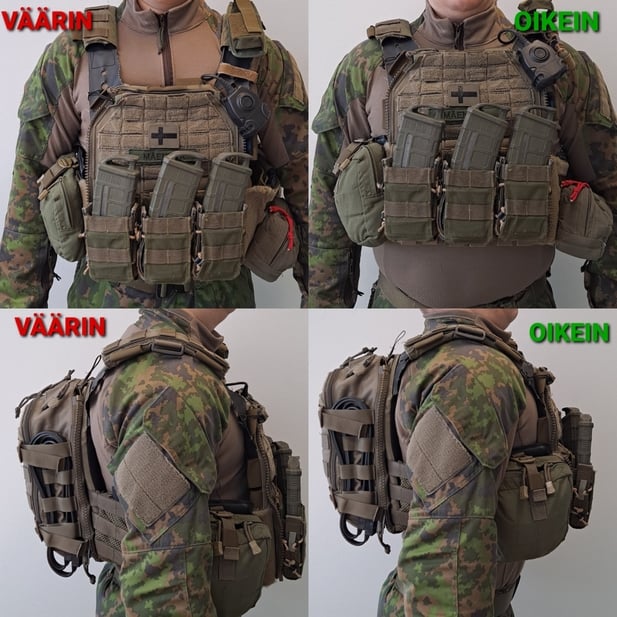
Oh ok, my bad.
That steel plate in the vest should absolutely be stopping those rifle rounds, that is their main purpose (shrapnel can be stopped with much lighter and more flexible Kevlar).
The fact that these are failing to stop those rounds shows that the steel is likely not heat treated correctly to the proper hardness. Considering how much weight those add to a loadout, if the rest of the vest is Kevlar, those soldiers would likely have a higher survival rate by ditching the ineffective plates entirely in exchange for better mobility.
Depends on the rating really. Some are only rated for small caliber hand guns. This might be one. Or it’s just for bolstering confidence and does fuck all.
Wait, are people down voting because they don’t think there are different types of plates, wild.
It’s BR4 rated, it should be stopping rifle rounds
If it is for hand guns, then it’s almost completely a waste, since the only pistol caliber guns I’ve seen in this war are only issued to Civil guard there, way behind the frontlines.
Oh agree, huge waste. But if it’s all that they have in guessing they don’t care.
I assume people are down voting because it’d be really dumb if that were the case. Sure, it technically could be, but it’s really just grasping at straws for no reason. The most obvious answer is probably the correct one. It’s probably just poor quality.
the us just spent a lot of money picking a new assault rifle specifically because they wanted one that could actually penetrate kevlar now that russia and china are issuing it to their troops
well, i guess maybe china is issuing it to their troops
No, the plate they are showing is specifically made to stop rifle rounds (BR4 rating)
deleted by creator
Bold of you to assume they get back plates.
Sapi plates, specifically over level 4 can stop, on average, a single rifle shot. It’s more of a second chance than “bullet proof” though.
These are way too thin for ESAPI plates or equivalent. I’m pretty sure this is literally just a random piece of sheet steel.
Fair, I was more saying there are plates that can stop rounds when referring to “these things”, but ya these specific plates don’t look nearly thick enough. Or if you’ve ever had to wear them you know, heavy enough.
For real that’s my understanding. I think even small arms munitions as well.

















